If you’ve ever wandered the streets of Nigeria, you’ve likely come across the irresistible snack known as the Nigerian eggroll. Unlike the egg rolls you might find elsewhere, this version is uniquely Nigerian—a whole boiled egg encased in soft, slightly sweet dough, deep-fried to crispy perfection. It’s the kind of snack that’s both simple and satisfying, combining the richness of an egg with the comfort of dough, making it a perfect grab-and-go treat.
Let’s recap: sweet eggroll! Sweet eggroll, na wa oooo!!! Ehn ehn ehn ehn, you too do oooo. This went viral with the fish pie
And like the fish pie, eggroll is a popular street snack you’ll find on practically every street corner. Trust me, this snack right here was a life-saver back in my student days. Even now, it’s still saving students in primary, secondary, and tertiary schools. Pair it with a big Orobo Coke, and you’re set for the day! Eggroll also makes a quick and filling breakfast when served with tea or juice.
For many of us, eggrolls hold a special place in our hearts, evoking memories of after-school treats, market day trips, and family gatherings. It’s a nostalgic bite for those who grew up with it. And the best part? It’s super easy to make, much like the popular scotch egg. With just a few ingredients, you’ll have a golden, crispy eggroll ready to enjoy at home. If you’re looking to make the perfect Nigerian eggroll, then this recipe is for you.
Ingredients:
300g of flour
1/4 teaspoon of salt
30ml of sugar (or 2 tablespoons)
5ml (1 teaspoon) of baking powder
A pinch of yeast (optional, especially for commercial purposes)
50g of melted butter
5ml (1 teaspoon) of vanilla flavor or any flavor of choice
1.25ml (¼ teaspoon) of nutmeg
½ cup of water or liquid milk (add more as needed)
Hard-boiled eggs (peeled)
Instructions:
Mix the Dry Ingredients:
In a bowl, combine the flour, salt, sugar, baking powder, and nutmeg. If using yeast, add it at this stage.
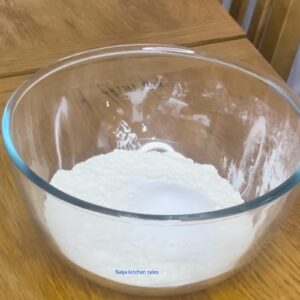
Add the Wet Ingredients:
Pour in the melted butter and mix it into the dry ingredients until well incorporated.
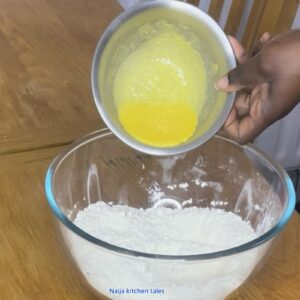
Combine and Knead:
Gradually add water or liquid milk and the vanilla flavour (or your chosen flavour) mixing as you go until you achieve a soft, slightly firm dough. The dough should be smooth and not sticky, so add liquid carefully.
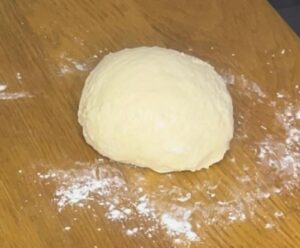
Boil the Eggs:
While preparing the dough, boil your eggs until they’re hard. Allow them to cool, then peel and set aside.

Wrap the Eggs:
Divide the dough into equal portions, depending on how many eggs you have. Flatten each portion, place an egg( the egg should be rubbed with flour) in the centre, and gently wrap the dough around the egg, sealing it completely.
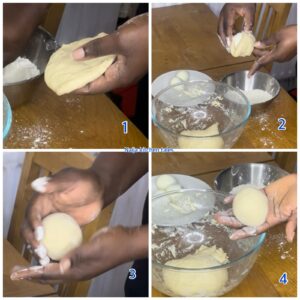
Fry the Eggrolls:
Heat oil in a deep pan over medium heat. Fry the eggrolls in batches, turning occasionally until they’re golden brown and cooked through.
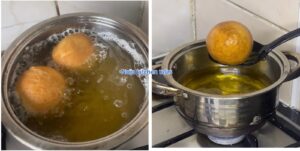
Drain and Serve:
Remove the eggrolls from the oil and drain on paper towels.
Enjoy the Perfect Eggroll!
These Nigerian eggrolls are delicious when served warm. The crispy exterior, combined with the flavourful dough and soft egg inside, makes them a satisfying snack for any time of the day. They’re great for breakfast, as a snack, or even as a quick bite on the go.
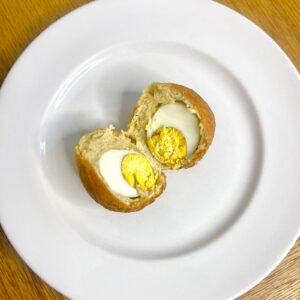
Nutritional Information (Approximate per Serving)
Here’s a rough breakdown of the nutritional content for one Nigerian eggroll (based on standard ingredients and portion sizes):
Calories: 200-250 kcal
Carbohydrates: 28g
Protein: 6g
Fat: 8g
Fibre: 1g
Sugar: 4g
The actual nutritional value can vary depending on the specific ingredients and serving size. Using liquid milk instead of water or adding more butter can increase the fat and calorie content. However, these eggrolls provide a good balance of carbs, protein, and fat, making them a filling snack or breakfast option.


Give a round of applause in the comments to show your appreciation!
Thank you! I truly appreciate the support. A big round of applause to everyone engaging and contributing to the conversation.
I love how this blog gives a voice to important social and political issues It’s important to use your platform for good, and you do that flawlessly
Thank you so much for your thoughtful comment! I truly believe in using this platform to shed light on important issues and it means a lot to know that it resonates with you. I appreciate your support.
It’s not often that we come across content that really resonates with us, but this one is a standout. From the writing to the visuals, everything is simply wonderful.
Thank you so much for your kind words! I’m delighted you enjoyed the content. Your support and feedback mean a lot. Stay tuned for more!
I love how you incorporate personal stories and experiences into your posts It makes your content relatable and authentic
Thank you so much! I’m really glad you find my posts relatable and authentic. I believe sharing personal stories helps create a genuine connection and it means a lot to know that it resonates with you. I Always aim to keep things real and inspiring! Just a quick one, did you try out any of my recipes and did it come out well?
I can’t get enough of your insightful articles and engaging stories. Thank you for sharing your passion with the world!
thank you for engaging